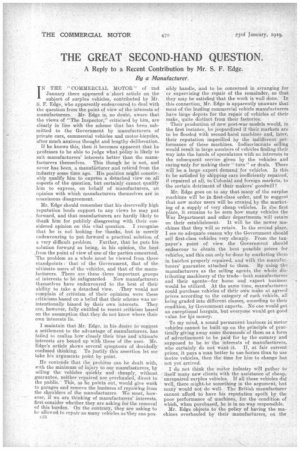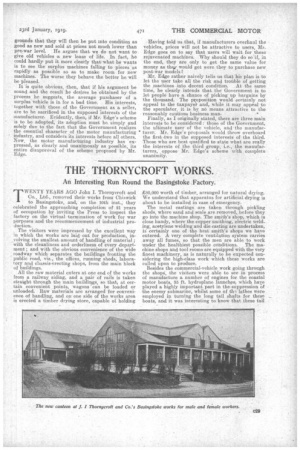THE GREAT SECOND-HAND QUESTION.
Page 8

Page 9

If you've noticed an error in this article please click here to report it so we can fix it.
A Reply to a Recent Contribution by Mr. S. F. Edge.
By a Manufacturer.
IN THE "COMMERCIAL MOTOR " of 2nd -January there appeared a ehort article on the subject of surplus vehicles, contributed by Mr. .F. Edge, who apparently endeavoured to deal with the question from the point of view of the interests of manufacturers. Mr. Edge is, no doubt, aware that the views of "The Inspector," criticised by him, are clearly in line with the scheme that. has been submitted to the Government by manufacturers of private cars, commercial vehicles and motor-bicycles, after much anxious thought and lengthy deliberation.
Ti he knows this, then it becomes apparent that he professes to be able to judge what policy is likely to suit manufacturers' interests better than the manufacturers themselves. This though he is not, and never has been, a manuficturer and retired from the industry some time ago. His position might conceivably qualify him to express a detached view on all aspects of the question, but certainly cannot qualify him to express, on behalf of manufacturers, an opinion with which manufacturers themselves are in unanimous disagreement.
Mr. Edge should remember that his deservedly high reputation lends support to any views he may put forward, and that manufacturers are hardly likely to thank him for publicly disagreeing with their considered opinion on this vital question. I recognise that he is not looking for thanks, but is merely endeavouring to put forward a practical solution of a very difficult problem. Further, that he puts his solution forward as being, in his opinion, the best from the point of view of one of the parties concerned. 'The problem as a whole must be viewed from three standpoints : that of the Government, that of the ultimate users of the vehicles, and that of the manufacturers. There are these .three important groups of interests to be safeguarded. Now manufacturers themselves have endeavoured to the best of their ability to take a detached view. They would not complain of .criticism of 'their opinions were these criticisms based on a belief that their scheme was unintentionally biased by their own interests. They are, however, fully entitled to resent criticism based on the assumption that they do not know where their own interests lie.
I maintain that Mr. Edge, in his desire to suggest a settlement to the advantage of manufacturers, has failed to realize bow closely their true and ultimate interests are bound up with those of the User. Mr. Edge's article shows several symptoms of decidedly confused thinking. To justify this assertion let me take his arguments point by point.
He contends that the problem can be dealt with, with the minimum of injury to our manufacturers, by 3elling the vehicles quickly and cheaply, without guarantee, neither repaired nor overhauled, direct to the public. This, as he points out, would give work to garages and remove the business of repairing from the shnnidera of the manufacturers. We must, however, if we are thinking of manufacturers' interests, first consider whether they are asking for the removal of this burden. On the contrary, they are asking to be allowed to repair as many vehicles as•they can poseae sibly handle, and to be concerned in arranging for or supervising the repair of the remainder, so that they may be satisfied that the work is well done. In this connection; Mr. Edge is apparently unaware that most of the leading commercial vehicle manufacturers have large depots for the, repair of vehicles of their make, quite distinct from their factories.
' Their production of new post-war models would, in the first instance, be jeopardized if their markets are to be flooded with second-hand machines and, later, their reputation imperilled by the indifferent performance of these machines. Indiscriminate selling would result in large numbers of vehicles finding their way into the hands of speculators with no interest e in the subsequent service given by the vehicles and caring 'only for making their "turn" or deals. There will be a large export demand for vehicles. Is this to be satisfied by shipping ears inefficiently repaired, if repaired at all, to Colonial and foreign markets, to the certain detriment of their makers' goodwill?
Mr. Edge goes on to say that many of the surplus machines -will be in first-class order, and to suggest that new motor users will be created by the market ing of a supply of very cheap vehicles. In the first place, it remains to be seen how many vehicles the War Department and other departments will retain on their establishment. It will be the newer machines that they will so retain. In the second place, I see no adequate reason why the Government should sell first-class vehicles very cheaply. From the taxpayer's point of. view the Government should endeavour to obtain the best possible prices for vehicles, and this can only be done by marketing them in batches properly repaired, and with the manufac turers' guarantee attached to them. By using the manufacturers as the selling agents the whole distributing machinery of the trade—both manufacturers and their agents—for home and export business would be utilized. At the same time, manufacturers could purchase vehicles of their own make at agreed prices according to the category of each vehicle, all being graded into different classes, according to their condition, by Government experts. No one would get an exceptional bargain, but everyone would get good value for kis.money.
• To ray mind, a sound permanent business in motor vehicles cannot be built up. on the principle of prac tically giving away some thousands of them as a form of advertisement to be paid for by the country and supposed to be in the interests of manufacturers, who certainly do not want it. If, at fair current prices, it pays a man better to use horses than to use Motor vehicles, then the time for him to change has not yet arrived.
I do not think the inOtor industry will gather to itself many new clients with the assistance of cheap, unrepairedsurplus vehicles. If all these vehicles did well, there mighttbe something in the argument, but many would not do well. The British manufacturer cannot afford to have his reputation spoilt by the poor performance of machines, for the condition of which, when purchased, he is in no way responsible.
Mr. Edge objects to the policy of having the machines overhauled by their manufacturers, on the grounds that they will then be put into condition as good as new and sold at prices not much lower than pre-war level, lie argues that we do not want to give old vehicles a new lease of life. In fact, he could hardly put it more clearly that what be wants is to see the surplus machines falling to pieces as rapidly as possible so as to make room for new machines. The worse they behave the better he will be pleased.
It is quite obvious, then, that if his argument be sound and the result he desires be obtained by the process he suggests, the average purchaser of a surplus vehicle is in for a bad time. His interests, together with those of the Government as a seller, are to be sacrificed in the supposed 'interests of the manufacturer. Evidently, then, if Mr. Edge's scheme is to be adopted, its adoption must be. simply and solely due to the fact that the Government realizes the essential character of the motor manufacturing industry, and considers its interests before all others. Now, the motor manufacturing industry has 'expressed, as clearly and unanimously as possible, its entire disapnroval of the scheme proposed by Mr. Edge. Having told us that, if manufacturers overhaul the vehicles, prices will not be attractive to users, Mr. Edge goes on to say that users will wait for these rejuvenated machines. Why should they do so 'if, in the end, they are only to get the same value for money as thew would get were they to purchase new post-war models I Mr. Edge rather naively tells us that his plan is to let the user take all the risk and trouble of getting the machines into decent condition. At the same time, he clearly intends that the Government is to let people have a chance of picking up bargains by the thousand. The proposition would certainly not appeal to the taxpayet and, while it may appeal to the speculator, it is by no means attractive to the reasonably cautious business man. Finally, as I originally stated, there are three main interests to be considered : those of the Government, the ultimate user of the vehicle, and the manufacturer. Mr. Edge's proposals would throw overboard the first .two in the supposed interests of. the third. Those who are best qualified to state what are really the interests of the third group, i.e., the manufacturers, oppose Mr. Edge's scheme with complete unanimity.






















